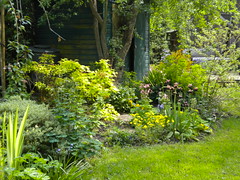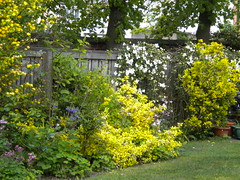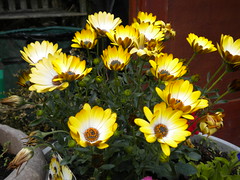Even though it’s almost 3 years since we wrote the SCONUL guidelines on library services for international students, we do still receive invitations to talk about them and Marie Scopes and I are off to the University of East London on Thursday. I have been collecting feedback from folks who have used the guidelines and hopefully we will be able to add some links to the SCONUL site soon to sites which have been developed using some of the ideas in our report. Once we have given our talk, I’ll add a set of the slides to my blog too.
NE and Yorkshire network for information and data handling
| Panda at Chengdu, July 2010 |
I’ve been pleased to be involved with Laura Jeffrey’s initiative to develop a network of folks who support researchers in developing information and data handling skills. With support from RIN and Vitae, Laura is inviting interested people to a launch meeting on 14th Feb from 10.30 to 3.00 in the Research Beehive here at Newcastle University. There is more info on the RIN website
It’s a great opportunity to get a mix of people together to think about how we can work more closely to support researchers so I do hope we get a good response.
New Old blog
I haven’t added any posts to my old info lit blog for over 6 months now, so I thought I would start 2011 with the usual good intentions to start again! I’ve finally decided to move from the Newcastle hosted blog to Blogger, partly because it is easier for me to access from anywhere to add posts, but mainly because folks couldn’t leave comments on my old blog, which was very frustrating. The first few posts are “old” new posts which just never got added to the old blog!
I’ll carry on including photos, as they seem to be popular and make it more fun for me too.
Here I am in the Forbidden City in Beijing, July 2010.
Twittering or tweeting?
I’ve recently started tweeting! We’ve been tweeting for a while as a library team – you can follow us here but I wasn’t sure quite how to use it more personally. However, Gareth Johnston gave an inspiring talk at the USTLG meeting recently and convinced me that I should try. It’s very addictive and I’m also impressed by the way in which tools like Hootsuite can help monitor activity. So if you want to follow my inanities on Twitter, you can do so here…

The garden again
More from UWIC
As well as having folks discuss some of the underlying pedagogical issues around IL I was keen to link the workshop to practical applications, so we looked in detail at some of the different things we do at Newcastle. There was some interest in the way in which IL is included on all the Module Outline Forms at Newcastle – it’s a great way to start a conversation about how IL issues are addressed. I also explained in detail how the environmental science course works here – I’ve talked and blogged about this before, but there is a little more detail on the slides in my last post.

Aquilegia in the garden
Info Lit at UWIC
I’m on my way back from running an IL workshop (entitled Developing 21st century graduates: thinking critically through Information Literacy) at UWIC in Cardiff. I had a really enjoyable morning, working with a mixed group of ~32 academic, library and teaching support staff. We started off thinking about perceptions of IL and looking at some of the different theories and definitions, considering IL as an integral part of the learning process. I like the definition of learning in Learning Reconsidered as it chimes very closely with my definition of IL as a combination of attitudes and behaviours (education) as well as skills and competencies (training). We also talked about the kind of things which impact on an individual’s information literacy, individual experiences, environmental influences and IT aspects and considered how they relate to my IL Landscape map.
One of the debates was around whether IL should be integrated into the curriculum, delivered as a separate module or some combination of the two. I’ve always believed in integration, though it can be difficult to scale across a whole institution and maybe a mixed model might be more practical – with the skills element being more generic and linked to a context specific element.
You can find some of the slides from the workshop here (I’ve taken out the activities and workshop specific ones).

More garden
Customer Care book
While we’re on the Customer Care theme, I must recommend the book Customer Care: a training manual for library staff, written by my friend Pat Gannon-Leary and her husband Mike McCarthy. It contains a wealth of practical ideas and scenarios which can be used in training staff and is written in an easy to read style. It’s the kind of book you can pick up and dip into, or use just to find a specific activity.

More from my garden
Welcome Host at Durham
As usual I thoroughly enjoyed running the Welcome Host customer care course last week,this time for ITS and library staff at Durham University. It is fascinating to observe how different people respond to the ideas in the course and I always learn something new myself. I read out an email sent to me from my Yoga teacher Marian, as I think it’s very relevant to how we respond when we’re busy and it’s helped me a lot. I’m sure she won’t mind me sharing it (it comes originally from a Bhuddist monk). Here it is:
“Do one job at a time. It’s not that we can do two jobs at the same time. It’s just that we try to. Have you ever found yourself having a conversation with someone and filling in a form and/or writing up a piece of work and/or working on the computer? You can sometimes get away with it with an automatic manual task, but it’s still taxing the brain. Even if we are expert multi-taskers, it’s still necessary to actually fully attend to what is being done. Failing to do this is one reason mistakes are made and accidents happen.
So we need to do one task at a time. That means paying attention to what we are actually doing. The effect is to increase our focus and span of attention. That is, our concentration is enhanced.
Create a pause between every task.
How do you react when the phone rings? Do you launch yourself at the phone? Have you noticed how mobile calls trump everything else? This sort of compulsive behaviour simply increases our agitation. And agitation is wasted energy.
When you come to the end of a task. STOP. Reflect on what you have done. Acknowledge it. And “put it aside”. Take a breath and relax. Let this be as long as it takes to feel inwardly calm. Most often it’s less than a minute.
Take the phone call for instance. Surely most people will wait for three to five rings. At the first ring, just acknowledge where you are with your work. At the second, stop and breathe, at the third calmly pick up the phone.
If we can begin each task with a mind uncluttered, with clarity, our efficiency is increased.”

Flowers in my garden
NTF Symposium: Screen capture and Russell Stannard
We had an interesting presentation from Russell Stannard from Westminster on screen capture software. I was aware of commerical products such as Camtasia, but I had never come across Jing before. Jing is a free and very simple screen capture tool, which enables you to record screen and commentary. (I did this years ago with Lotus screencam, but this is much easier). One of the neat things is that the files are stored remotely and you just have a short URL which you can sent to students or embed in a web page. Russell uses it to give individual feedback to students – by recording himself marking their work. They can watch him underlining things in their own document and hear what he is thinking as he does so!
He has also used the software to create a set of training videos – aimed at EFL teachers, so if you want to find out how it works and also learn about twitter or Jing, just have a look here
NTFS Symposium Sketchbook
I’ve just returned from the NTFS Symposium, held in the University of Westminster. As always, it was a wonderful opportunity for networking, as well as finding out what other NTFs are doing and hearing from some of the movers and shakers of the T&L world.
One technique which captured my imagination was the use of Sketch Notes by Clive Holtham from City University. Clive gave each of us a sketchbook at the start of the 2 day event and asked us to use it to record our reflections, both visually as well as in words. I found this a very liberating experience, with echoes of my own Wandering Minds approach (which I’ve blogged about before). Maybe it was because there were no lines in the book or maybe because I had a whole booklet to devote to just 1 conference. I found myself drawing boxes around quotes, sticking in post-it notes (and even a photo of me and my poster), writing sideways, using lots of arrows and smiley faces. As a consequence, my notes look much less neat than usual, but much more interesting! I wonder how this technique could be used more generally in teaching? I’ll certainly try to buy myself a stack of blank sketchbooks for future conferences…
